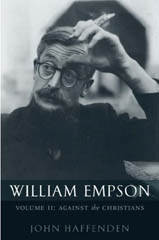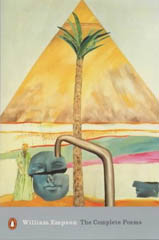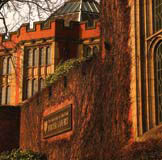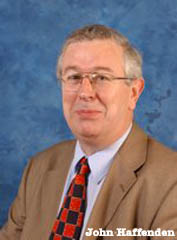Against the Christians
 Concluding his biography of the great eccentric poet-critic, Haffenden takes us from 1940, following Empson’s ‘long oriental interludes,’ first in Japan and then in China, his return to England, his appointment to a Chair at Sheffield, his stints abroad as visiting professor, and ultimately to the time he reluctantly had to go ‘to meet Milton’ in 1984.
Concluding his biography of the great eccentric poet-critic, Haffenden takes us from 1940, following Empson’s ‘long oriental interludes,’ first in Japan and then in China, his return to England, his appointment to a Chair at Sheffield, his stints abroad as visiting professor, and ultimately to the time he reluctantly had to go ‘to meet Milton’ in 1984.
Hoping he ‘would be allowed an interesting war by being let into the propaganda machine,’ Empson came back voluntarily from China, and, like Milton some three hundred years earlier, worked as a government propagandist. Joining first the Monitoring Service of the BBC at Evesham, he transferred to the Far Eastern Division of the Overseas Service to write policy papers and propaganda for broadcasts designed to belittle Japan and to bolster China. Haffenden observes that, ‘propaganda is the art of anticipating a response and thus of devising a form of persuasion which will secure acceptance and conviction; literary criticism is its close kin.’ Yet Empson found the art of black propaganda did not suit his character, nor did it come easily to him.
It was in the Overseas Service that he met a recruit to the African Service. Of Boer blood, ‘big and beautiful, with very blue eyes and very golden hair’, Hester Henrietta Crouse had studied at Bloemfontein University and trained in Cape Town as a sculptor, before travelling to Europe and arriving in England in 1938. In London she changed her passport and nationality and after a period of ‘char-ing
…graduated to the status of model for emasculated English artists who measure you with a ruler to make sure they get the proportions right.’ One of these artists was Vanessa Bell. Having driven since the age of fourteen, Hetta worked for the first few years of the war as a driver for the Auxiliary Ambulance Service before being employed by the BBC. As an Afrikaans speaker she would talk on a woman’s magazine programme as well as ‘deliver direct, pithy propaganda pieces designed to combat the gross amount of German propaganda being broadcast to South Africa.’ This ‘ravishing Afrikaans girl
… with her slender good looks, her vivacity and her force of character’ was exactly the kind of woman who could give Empson ‘the backing and stiffening’ he ‘wanted from a wife.’ In him, Hetta found ‘a sure-fire intellect, wit and steadiness of purpose’, and within a few weeks of meeting, they became engaged. This surprised many of Empson’s friends – not only that he was to marry ‘a tall and tough and attractive Boer’, but more simply that he was to marry at all: ‘it was assumed that the bisexual Bill was one of Nature’s lifelong bachelors.’
William and Hetta’s married life began a little inauspiciously. George Orwell, who had been invited to the wedding, but had refused to attend, presumably because he had offered to divorce his wife to marry Hetta, sent instead a carving knife and fork, which the Empsons ‘rightly interpreted as an aggressive gift.’ After the ‘no-nonsense’ marriage ceremony, a beer party was held in their basement flat in a partly bombed building in Camden, at which Dylan and Caitlin Thomas ‘ended up fighting furiously’. As the party ‘wound to a close, Empson turned to Hetta and said, ”Well, I’ll be going my dear” – and off he went to his erstwhile digs.’ Haffenden suggests that Empson ‘may have wanted to avoid
… cleaning up after the party, but it is far more probable that he had drunk enough to forget he had got married and should be living with Hetta from now on.’ This ‘forgetfulness’ was to characterise the rest of their marriage, with both Empson and Hetta taking lovers and living for the most part in separate households. Despite – or perhaps even because of – the openness of their marriage and the oddness of their domestic arrangements, the marriage lasted until William’s death. The Empsons’ marriage is portrayed by Haffenden variously as grotesque, loving, scary, tender, terrifying, embarrassing and darkly hilarious, but never as dull.
With marriage came fatherhood, and then after the war, Empson decided to return to China, this time with his wife and their two young boys. Haffenden writes that, ‘at the National Peking University
… Empson felt an emotional commitment to the welfare of his students and colleagues which fell well short of the ideological identification with Mao-Tse-tung’s campaign which increasing numbers of students avowed.’ (Unlike Hetta who was a member of the Communist Party of Great Britain, and ‘played a more active role in working for the progressive cause in China’, Empson was not a communist.) A highly idiosyncratic teacher, with a most unusual teaching style that included a rapid delivery of unscripted information and ideas, and never having any eye contact with his students, Empson was by no means ‘oblivious to the students’ difficulties in following his speech and ideas’. But those who persevered, Haffenden writes, ‘clearly grew to revere him, and to delight in his odd conduct.’ For these Chinese students, one of the most challenging aspects of Empson’s approach to teaching was ‘his policy of pressing students to quiz any creed and its specifics, whether political or literary’ and his insistence ‘upon the supreme importance of independent judgement’. If his students were insufficiently critical of any text being studied, Empson would write on the blackboard: ‘If you believe everything you read you are much worse off than if you were unable to read at all. No Chinese peasant would believe this obvious nonsense that you pretend to agree with because you think teacher wants you to agree with it. Unless you learn to think for yourself your whole education is only a means of making you more purblind than if you had been left at home.’
 Literature and art, as with every other human activity under the Maoist sun, were to be subject to radical and ideological reorientation: ‘to be promoted to serve the people, to enlighten the political consciousness of the people, and to encourage the labour enthusiasm of the people’. More specifically, Article 46 of the ‘Common Programme’ stated, ‘the method of education of the People’s Government shall reform the old educational system, subject matter and teaching methods systematically according to plan’. This was to have direct implications for Empson, though he ‘refused to let it knock him off course.’ But university reforms required all staff to ‘boldly criticize their erroneous and incorrect attitudes… examine themselves and oppose… self-complacency and self-delusion… and boldly criticize each other’, while ordering all to ‘voluntarily undergo mind-reform by way of a planned and systematic study movement’ and ‘to forsake the influences of the Anglo-American reactionary capitalist class, along with all erroneous trends such as ”objectivism” and ”individualism”, everyone should henceforth cleave to the pantology of Marxist-Leninism and the Thought of Mao Tse-tung.’
Literature and art, as with every other human activity under the Maoist sun, were to be subject to radical and ideological reorientation: ‘to be promoted to serve the people, to enlighten the political consciousness of the people, and to encourage the labour enthusiasm of the people’. More specifically, Article 46 of the ‘Common Programme’ stated, ‘the method of education of the People’s Government shall reform the old educational system, subject matter and teaching methods systematically according to plan’. This was to have direct implications for Empson, though he ‘refused to let it knock him off course.’ But university reforms required all staff to ‘boldly criticize their erroneous and incorrect attitudes… examine themselves and oppose… self-complacency and self-delusion… and boldly criticize each other’, while ordering all to ‘voluntarily undergo mind-reform by way of a planned and systematic study movement’ and ‘to forsake the influences of the Anglo-American reactionary capitalist class, along with all erroneous trends such as ”objectivism” and ”individualism”, everyone should henceforth cleave to the pantology of Marxist-Leninism and the Thought of Mao Tse-tung.’
Presumably because he was a foreigner, Empson was ‘excluded from the labour of mental rectification, including struggle meetings for criticism and self-criticism
… and his colleagues took pains to protect him from that form of inquiry and assault.’ But during this time, he had far more arduous work to undertake: defending English literature as a subject fit for study. This he achieved in some measure, although there was pressure on him to make his subject politically relevant and acceptable to the university authorities. Moreover, his elder child needed to start schooling in England. Also at that time, the number of British nationals in Peking was on the decline and Empson’s teaching was only a few hours a week. In professional terms, he found it difficult to keep abreast of developments in his own field, and more importantly he was ‘coming to feel less useful in general
… and that it was nearly time to go home.’
Before leaving China, Empson heard that L.C. Knights would be resigning from his Chair at Sheffield. Writing a ‘sloppy and scantily informative letter of application’ to the registrar before the vacancy was advertised, Empson said, ‘it may be felt that my published work has been rather specialized, but I would try to provide what was wanted in the post and not merely indulge in my specialities. I wish to add that I am myself a Yorkshireman, and my relations live there.’
The Empsons returned to their house in Hampstead, and ‘with no immediate prospect of a full-time income’ they let rooms to impoverished students to help make ends meet. (Two such students were Bob Harris, later of The Old Grey Whistle Test and the chef, writer and restaurateur Ken Lo, to whose 1971 Peking Cookery Empson would contribute a foreword. In a memoir published in 1993, Lo was to remember that the ‘main attraction at Studio House was Mrs Hetta Empson…a tall South African who was at least as handsome as Ingrid Bergman.’)
 When the Sheffield vacancy was advertised, Empson was informed the ‘university wanted twenty copies of his application, with names of referees, and testimonials… so he hastily put his papers into the correct form.’ References and testimonials came from the surrealist writer Hugh Sykes Davies, L.C. Knights himself, the American critic John Crowe Ransom, E.M.W. Tillyard, and I.A. Richards. With the selection panel initially being perhaps more in awe of the candidate than the candidate was of them, ‘in the days leading up to the interview’, each of the selectors ‘rushed around trying to get hold of a copy of Seven Types of Ambiguity… and also wondered what to expect when Empson appeared before them.’ Disappointingly for the panel, at his interview, Empson ‘was too nervous to hold the floor… and his responses were singularly abrupt… The committee asked about his work in the Far East… about giving classes from memory, and about how he had handled young Chinese communists in recalcitrant mood… Finally they asked, did he think he could manage the arduous and tiresome tasks expected of a Head of Department? I can do sums, he responded, I shall be able to add up the marks… After the laughter had died away, this big issue was not pursued.’ Empson was to write when he retired from Sheffield in 1971, ‘I was considered a bold appointment… They went in for bold appointments in those days.’
When the Sheffield vacancy was advertised, Empson was informed the ‘university wanted twenty copies of his application, with names of referees, and testimonials… so he hastily put his papers into the correct form.’ References and testimonials came from the surrealist writer Hugh Sykes Davies, L.C. Knights himself, the American critic John Crowe Ransom, E.M.W. Tillyard, and I.A. Richards. With the selection panel initially being perhaps more in awe of the candidate than the candidate was of them, ‘in the days leading up to the interview’, each of the selectors ‘rushed around trying to get hold of a copy of Seven Types of Ambiguity… and also wondered what to expect when Empson appeared before them.’ Disappointingly for the panel, at his interview, Empson ‘was too nervous to hold the floor… and his responses were singularly abrupt… The committee asked about his work in the Far East… about giving classes from memory, and about how he had handled young Chinese communists in recalcitrant mood… Finally they asked, did he think he could manage the arduous and tiresome tasks expected of a Head of Department? I can do sums, he responded, I shall be able to add up the marks… After the laughter had died away, this big issue was not pursued.’ Empson was to write when he retired from Sheffield in 1971, ‘I was considered a bold appointment… They went in for bold appointments in those days.’
While Empson, who had never taught at a British university, nor ‘had even taught an English-speaking student’, was relieved and pleased to be appointed, Hetta ‘took one look at the ambience of postwar Sheffield and decided it was intolerable: a grim, grimy, smelly place’. For the rest of Empson’s time at ‘plucky little Sheff’, Hetta remained at Studio House in Hampstead, coming north to the university as ‘Professor Empson’s consort’ only on the occasion of royal visits, while he took up residence in ‘the rear ground floor of a tenement dwelling at Wharncliffe Road’ – that is, in little more than a cellar. Dubbed by Hetta ‘The Burrow’, it soon became known, ‘throughout the university and beyond’ as ‘Empson’s Burrow’. Consisting of a twelve-foot square room which served as bed-sitting room, with a minuscule kitchen-area abutting, and the use of a toilet on the first floor, the ‘Burrow’ was heated by a portable single-bar 14-inch electric fire, supplemented by a ‘pink paraffin stove’. This is where Empson would live for the next seventeen years, barely able to look after himself, but in the university acquiring ‘a reputation for being something of a character… endearingly eccentric and utterly uninterested in formal propriety
… cultivating unforbidding relations with staff and students’ – and producing most of the remainder of his great works of criticism.
To some students ‘he became virtually a guru’ and came ‘to be valued by the large majority of his colleagues in other departments’. In making appointments, he set about ‘deliberately to seek a genuine diversity of approaches among staff’, though his ‘approach to interviewing could be idiosyncratic and disconcerting’, and ‘his judgements incalculable’. At Senate meetings, ‘which appeared to cause him agonies of boredom… he would do his best to distract himself with algebraic doodles… and felt incited to speak only occasionally, though often to useful effect’. Empson was ‘to find a great deal in his new role which gave him immense satisfaction
… and was delighted to have found his fit place in an English university’. As Haffenden points out, he was relieved ‘not to have to pursue a full-time career in literary journalism’. In a letter to Boris Ford in 1959, Empson wrote that the university afforded the literary critic a kind of protection from hackwork as well as an audience: ‘a university job does at least mean that you are free to print in a decently considered manner
… and it therefore seems to me very shameful when young writers imagine that this is a shameful way to come to terms with the society they are living in – though I must say I never understand why they don’t try to become postmen in country districts, surely much the best job for the type of writer who needs to feel uncontaminated.’
Empson enjoyed various sabbaticals, teaching in the US and Canada as a Visiting Distinguished Professor. In the first few years of his retirement he was eager to secure visiting appointments abroad: his occupational pension was based on fewer than twenty years’ teaching service in the UK. One student whom he taught at York University in Toronto recalled Empson as being ‘enormously gentle with us, and kind in his criticism. Each week one of us would write a short paper
… and read it aloud at the start of the class.’ After one paper was read, an allegorical interpretation of Robinson Crusoe, ‘Empson paused… and then said, ”you mustn’t make the mistake as Tom Eliot, of reading everything as Christian.” It took all of us a few seconds to translate ‘Tom Eliot’ into T.S. Eliot and a few more to recognise that this was not name-dropping on his part. At that moment, something quite wonderful happened: we realised that we were being taught by someone who knew poets like Eliot; and who also had the common courtesy to respond in this way. Our mistakes, as readers, were not student mistakes in some embarrassing way; they were to him errors of interpretation that we shared with someone like Eliot. We all felt like we were being treated very seriously – probably far more so than we deserved.’
And David Jones, the chemist, science writer and playwright, and one of the Empsons’ many lodgers, wrote in a Personal Memory of William Empson, ‘he couldn’t bear gossip or dullness and he seemed particularly sensitive to a potential outbreak of one or the other. He delighted in active minds, his own being perpetually at work. This is his distinction from the majority of people: he thought critically (in the positive sense) all the time. I never once heard him refer to anything reported without illuminating some deeper or unconsidered significance, or demonstrating its stupidity. He was absorbed with thought, and this demand upon his time excluded him from much genial society. By the time I met him, the friends of his youth were mostly dead, and they are never replaceable. He shared Hetta’s friends, but though everyone loved William, ultimately, apart from his family, he had no great friends. But he had no time for sentimentality and never complained of loneliness. He liked to be solitary and was at great pains to be alone… If he was not visiting libraries, he would spend most of the day in his study bashing away at his old Remington; it could still be heard rattling away at three in the morning. His work was his life.’
 These thoughtful and sensitive eulogies to the teacher and friend make way for Haffenden’s own summing-up in the last few pages of his magisterial study, where he writes, ‘the record tells that he met the multiple challenges of his extraordinarily varied and demanding life – extending as it did from Yorkshire to Cambridge, and from Japan to China and the USA, and not forgetting the rich, difficult, entertaining and productive years at Sheffield – with rare resolution and resourcefulness. His genius made of him one of the foremost literary critics of the twentieth century; and in many senses he really did invent modern literary criticism in English; and his aptitude and application produced some of the masterpieces of the century: Seven Types of Ambiguity, Some Versions of Pastoral, The Structure of Complex Words, and Milton’s God – all of which abound with clarifying ideas and fresh insights, and with conceptual brilliance, as well as the courage of risk.’
These thoughtful and sensitive eulogies to the teacher and friend make way for Haffenden’s own summing-up in the last few pages of his magisterial study, where he writes, ‘the record tells that he met the multiple challenges of his extraordinarily varied and demanding life – extending as it did from Yorkshire to Cambridge, and from Japan to China and the USA, and not forgetting the rich, difficult, entertaining and productive years at Sheffield – with rare resolution and resourcefulness. His genius made of him one of the foremost literary critics of the twentieth century; and in many senses he really did invent modern literary criticism in English; and his aptitude and application produced some of the masterpieces of the century: Seven Types of Ambiguity, Some Versions of Pastoral, The Structure of Complex Words, and Milton’s God – all of which abound with clarifying ideas and fresh insights, and with conceptual brilliance, as well as the courage of risk.’
In his brief summing-up, Haffenden naturally refers to the life achievements of this revered teacher and critic. But nowhere in his authoritative study does he avoid making Empson human, and at times all too human. This is most notable when he writes about Empson’s extravagant if not virtuosic drinking, his sexual shenanigans, (though Hetta’s sexual bohemianism is rather more fully documented than William’s), and much more comic, his relationship in his later years with his plastic teeth and his tendency to remove them when giving public readings.
The title of volume II – Against the Christians, which balances nicely with that of volume I, Against the Mandarins, published last year – refers to Empson’s ‘blazing and principled antagonism to blindly Christian readings of literature’, which occupied a good deal of his time after his return to England. In fact he spent more than a quarter of a century on his campaign on ‘anti-Christian revisionism’ and against those ‘Christian literary critics who insultingly reduce to pious paradox all too many productions of complex mental struggle’. According to Haffenden, this ‘fixation was at times extreme if not obsessional’. But out of it came ‘the devastatingly fierce and pellucid polemic’ – Milton’s God – which was first published in 1961.
Although in most biographical and reference works, William Empson continues to be referred to as a ‘poet-critic’, his career as a poet ended not long after the time of his marriage. His poetry was admired by T.S. Eliot, Allen Tate, Philip Larkin and even John Betjeman, and while one or two of his poems appear in some of the great anthologies of twentieth-century English verse, his work in poetry is little-known. As if by way of compensation, Haffenden includes the previously unpublished draft of Empson’s long poem, ‘The Wife is Praised’.
More than twenty years in the making, Haffenden’s work exemplifies a masterly achievement in the sphere of literary biography.
© Michael Lister
John Haffenden. William Empson. Volume II: Against the Christians. Oxford University Press. 0199276608. £30

Camila on Sun, 14th Oct 2012 2:42 am